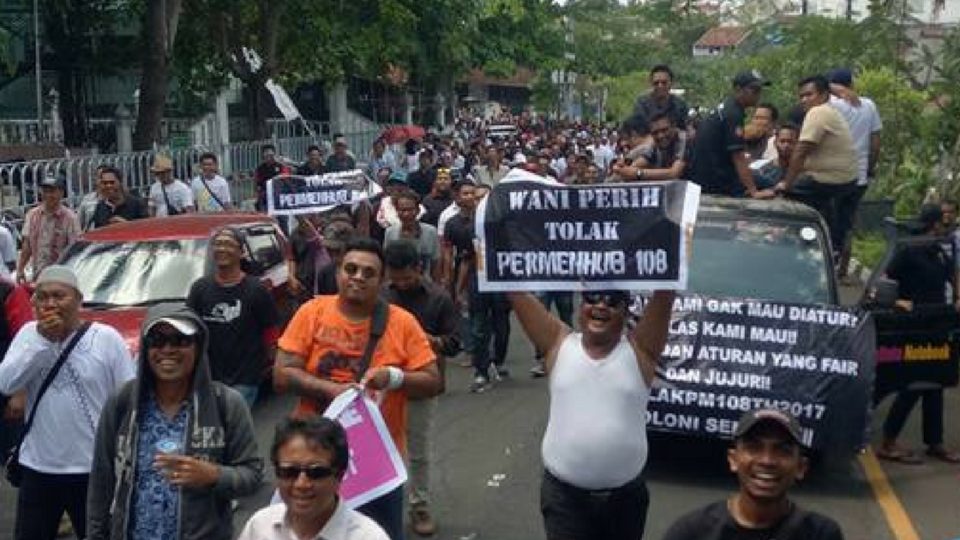Tomorrow, a new set of regulations on the nascent ride-hailing service industry in Indonesia (where car drivers for Uber, Grab and Go-Jek are often referred to locally as “online taxi”) from the Ministry of Transportation are set to take effect.
The new rules are intended to replace earlier regulations that were struck down by the Supreme Court, with the government claiming the new regulations were made in consultation with representatives of both conventional taxi companies and the ride-hailing industry.
But several protests organized by drivers working for the big 3 ride-hailing services, the most recent of which took place today in Yogyakarta, show that there are plenty of people who are unhappy about the new regulations.
Hundreds of members of the Yogyakarta Online Driver Association (PPOJ) rallied at front of the Yogyakarta House of Representatives building on Jalan Malioboro today to demonstrate against the regulations, calling them overly unfair to online taxi drivers.
https://www.facebook.com/yaser.arafat.9047/posts/10209528576663898
PPOJ Chairman Muhammad Anshori said that the new regulations should be rejected for the on the same grounds that the Supreme Court struck down the previous ministerial regulations that were struck down for artificially decreasing the competitiveness of ride-hailing companies, noting that many of the new rules were the same or similar
“We are here to voice our aspirations to refuse (the new Transport Ministry regulations), whose points have been rejected but have reappeared,” Anshori said as quoted by Kompas.
One of the points reappearing in the new regulations is a rule that all ride-hailing drivers need to place a large sticker, 15 centimeters in diameter, on their cars to indicate the company they work for.
“Our cars are a personal asset, so why should we have to use a sticker like that? It’s not logical. That would reduce the value of our cars, while one of the advantage of online taxis is that they are private cars that can be sold,” Anshori told reporters.
Anshori said the new regulations also infringe on the rights of ride-hailing drivers in other ways, like the requirement of additional roadworthiness tests for their cars. He said that and the additional obligations placed on online taxi driver were counter to President Joko Widodo’s directive that the government simplify business licensing processes.
Today’s protest in Yogya follows another protest in front of the Transportation Ministry building in Jakarta last week.
One of the other contentious points in the new regulations is mandatory minimum and maximum tariffs for ride-hailing services to bring their prices in-line with those charged by conventional taxi meters. The government says the tariff limits are meant to prevent unfair competition and protect consumers from exorbitant surge pricing during peak hours, but critics say it will prevent ride-hailing companies from keeping prices low for consumers.
In August, Indonesia’s Supreme Court struck down the Transportation Ministry’s previous set of ride-hailing regulations, saying that the existence of their services is a natural consequence of technological advancement and demand for cheap and efficient public transportation options. It is likely that the new regulations will be similarly challenged.




